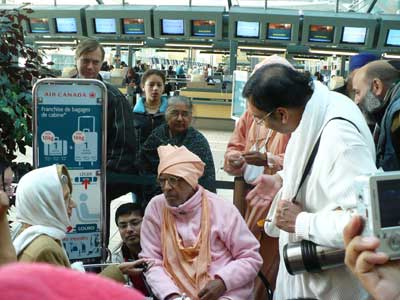(Vedic Cultural Center, Vancouver, Canada, April 20, 2001, pm)
[Two hundred devotees gathered at the very grandiose Vedic Cultural Center in Vancouver. After taking darsana of the large Deities of Radha-Krsna, Sita-Rama, Siva-Parvati, and Durga devi, they heard the following lecture by Srila Narayana Maharaja. In this lecture Srila Maharaja helped all to understand the respective positions of these Deities in relation to themselves.]
Kirtanananda and so many others were there with Srila Swami Maharaja on the eve of his departure, and therefore I don't know why he selected me. He told me, "With your own hand you should give me samadhi." He requested me, not once, but several times on that very day, that I should help his devotees. He said, "I have collected so many monkeys from here and there." I don't want to say this, but this is what he really told me. He didn't speak in English; rather he spoke in Bengali to conceal it. If he did not do so, his disciples may have become angry. He said so many things in Bengali, and other things he said in English for his disciples to know. He called his disciples to him and said, "You should hear from Narayana Maharaja and try to follow forever. I want him to help you to become good devotees." I followed his order.
He told me so many things. I gave him samadhi according to all the Vedic rules and regulations. My Gurudeva had taught me all these things. I learned from him how to perform a marriage, how to give sannyasa, how to perform a fire sacrifice for establishing Deities (vigraha pratistha) and all other things.
I have come here to the West only to obey your Prabhupada. Wherever he went is a very sacred place for me. I am going to all of these places to take his lotus dust. Srila Swami Maharaja is sending me, having inspired me to go all over the world where so many are honoring and hearing from me. By his mercy I have traveled so many times around the world - from east to west, north and south. This is his mercy. I am like a dry straw without any qualification. I am nothing. The inspiration of my siksa and diksa gurus is my everything. Their mercy is everything.
We are here in Canada in this Vedic Cultural Center. Actually, we should know what is Vedic culture. We think we know, but really we have many misconceptions. What is Veda? Veda means knowledge. Knowledge of what? Where did this world come from, who are we, and what is this universe? Why do we become old and why do we die? We don't want to become old, but still we become old. We don't want to die, but still we die. We want to be happy, but still we are unhappy. Why are we born? A person may not want to be blind or lame from birth, but still it is so. Why is a person born in that family? Why is someone born in the family of the president of America and someone else is born in the family of a very poor beggar? Even though someone may study for sixteen years, still every year he fails his exams. Why does he have no intelligence? Some are dumb. Why?
Buddhism and all other religions cannot give complete explanations. Vedic culture, sanatana-dharma, however, has the answers that completely satisfy these inquiries. Vedic culture means to know the answers to all these questions: why do we become old and who created this world? After death, what becomes of us? Why is one very happy throughout his life and someone else is suffering since birth? Veda has explained everything completely. Not a single question remains unexplained. Everything is solved.
Who spoke the Vedas? Bhagavan Krsna Himself. There are no faults in the Vedas, Whatever has been spoken in Veda is correct to the fullest extent. Previously there was only one Veda, and that was Atharva Veda. Vyasadeva realized that the people of kali-yuga would not be able to understand the language of this Veda, and he therefore divided it into four: Rg Veda, Sama Veda, Yajur Veda, and the remaining portion was again called Atharva Veda. In this way, four Vedas were created. What is the subject matter of these Vedas?
The four Vedas were again divided into two: Brahmana Veda and Upanisad Veda. The Brahmana Veda describes fire sacrifices which can fulfill any earthly desire, as well as any heavenly attainment. Even the desire to attain Brahmaloka could be fulfilled by fire sacrifice. A person who had no sons could, by fire sacrifice, have many sons. Someone who was ill could become very healthy. Someone could have ten heads like Ravana. By fire sacrifice, someone could also become like Hiranyakasipu. Hiranyakasipu could not be killed in the day or in the night, in the sky or on land, inside or outside, nor in any month of the year. He attained all these by the power of fire sacrifice. This is Brahmana Veda.
Who can perform such sacrifice? What qualities are required?
["1) One who invokes the particular deities (devatas) to be present in the sacrifice by reciting the mantras of Rg-Veda, and thus performs the sacrifice, is called hota.
2) One who sings aloud the hymns of Sama-Veda in adoration of invoked deities is called udgata.
3) The adharvyu murmurs the prosaic section of the Yajur-Veda, and performs his specific duties. His participation in yajna is quite prominent. 4) Protecting the yajna from external obstacles, rectifying possible mistakes in recitation, and removal of various types of discrepancies arising in the detailed performances related to yajna, is the function of brahma. He is the chief priest of yajna. He supervises the over-all functioning of yajna and rectifies the faults. So this brahma is considered superior to all other rtviks, priests. Hence, it is imperative for the brahma, who undertakes the main responsibility to supervise the whole sacrifice, to have complete knowledge of all three Vedas (Rg, Sama, Yajur)." (True Conception of Guru-Tattva)]
They should all be qualified by knowing and following the rules and regulations of Brahmana Veda. However, the desires that are fulfilled in this way are all for worldly desires.
Upanishad Veda is comprised of transcendental knowledge, and it is also called Vedanta-the essence and conclusion of all the Vedas' knowledge. What is this jagat? Who is Brahma? Who is the creator? What happens to the living being after death? The Upanishad has all conclusions. . Upanishad Veda has many divisions, such as Aranyaka, and so on, for those in household life, and also for others who have given up everything and gone to the forest to remember the Supreme Personality of Godhead-Parabrahma.
In the land of Bharata (India) there were, and still are, people who can recite all the slokas of the Gita from memory. Vyasadeva kept all the mantras of the Vedas in his heart and could speak them. As this age advances, however, there is no real brahmacarya - all are becoming lusty. There is no proper food, and no proper air or water. Now, in so many parts of the world, you have to buy mineral water. Nowadays there are practically no uncontaminated vegetables or foods in this world, and this is a very big problem.
For those of this age who have less intelligence, Srila Vyasadeva wrote a very useful book called Vedanta Sutra, Upanisad Sutra, or Brahma Sutra. Therein Vyasadeva reconciled all the teachings of the Vedas and Upanishads and compiled the essence of that into 550 sutras.
Sometimes in the Vedas and Upanishads it seems to indicate that Brahma is nirakara - brahma-nirvisesa-nirakara.avyakta anadi - without form or qualities. The actual teaching of Veda is that Bhagavan has form, but people today will not believe it. Vyasadeva has reconciled everything. Modern people won't believe in Krsna, but they will believe in impersonalism. Especially now I am seeing that everywhere in the world Buddhists are preaching so much, but they don't acknowledge or accept the form of the Supreme Personality of Godhead. Either they don't recognize or they don't tell - that Brahma has form.
We see that Christians are also not properly accepting the form of God, although it is written in the first chapter of the Bible that God created man after His own image. They cannot deny this statement from their own scriptures. Why are they not admitting the form of God? If He is Father and Jesus is His Son, and if His Son has some shape, the Father must also have some shape. Surely. they cannot deny this. But they are ignorant of the deep philosophy within the Bible.
Muslims also don't accept that God has form. They also deny it, but in their Koran it has been written that God has made man in His image. So this also cannot be denied. The Buddhists don't have any faith in God at all. Why, therefore, are there so many Buddhist murtis? I have seen some deities of Buddha that are more then 25 feet high. Why are there so many forms of Buddha throughout the world? Why are they doing this? Where has this form come from? They cannot reconcile these truths.
We must have faith that God has form. The first instruction in the Veda is that God has a form-Bhagavan has shape. He has so many attributes and qualities. He is so powerful. He can create, in a second, lakhs and lakhs of universes. Then, in a second, He can destroy them. He can make a dry straw the master of the whole world, and he can turn a master of the whole world into straw. The word impossible does not exist for Him. He can do everything - He is God: G-Generator, O-Operator, D-Destroyer. So many qualities are there - all qualities are there.
Vedic culture insists that you should give all honor to your guru, be very respectful to your Vedic culture, and give up your wicked ways. A man may ask, "Why do you worship so many demigods and gods like Ramacandra, Varahadeva, Nrsimha, Siva, Sankara, Ganesa, Kali, and Durga?" We actually have only one God. However, if there is a king, a queen must be with him. If one is king, a kingdom must be there with many officials and generals. In the same way Krsna, the Supreme Personality of Godhead, has multiple energies and deputed servants.
After compiling Vedanta Sutra, Vyasadeva saw that no one would be able to understand it and reconcile it, and therefore he wrote a bhasya, commentary. What is that bhasya? Srimad Bhagavatam is the complete commentary on Vedanta Sutra. Whatever was in the Vedas, Upanisads, Aranya, etc., he put in Vedanta Sutra. Then, again he explained it, first in Gita and then in Srimad Bhagavatam. The essence of all Upanishads was given by Sri Krsna in Bhagavad-gita, and the essence of all Vedas, all Vedic literature, is Srimad Bhagavatam.
nigama-kalpa-taror galitam phalam
suka-mukhad amrta-drava-samyutam
pibata bhagavatam rasam alayam
muhur aho rasika bhuvi bhavukah
["O expert and thoughtful men, relish Srimad-Bhagavatam, the mature fruit of the desire tree of Vedic literatures. It emanated from the lips of Sri Sukadeva Gosvami. Therefore this fruit has become even more tasteful, although its nectarine juice was already relishable for all, including liberated souls." (Srimad Bhagavatam 1.1.3)]
Buddhists say that this world is false, but it is not false. We see that Rama has come here, Krsna has come, and Sankara has also come to this world. How can this world be false? It is never false. You are not this physical body. To think that this physical body is you or your spiritual body is false. The conception of this physical body as oneself is quite false. My relations - this is my father, this is my mother - are all false. They will one day die and be put into a cremation ground.
At one time we were very beautiful. In our youth, when we were about sixteen years of age, we were very beautiful. But how will the most beautiful teenage girl talk when her teeth are gone? What will became of one's beautiful hair when it is white?
You cannot take anything from this world at the time of death. To identify with the body is to be like the dogs. These are not my words. Veda is telling these things. Dharmena hinah pasubhih samanah. Having this human body, when there is a chance to realize, they are not realizing who is the Supreme Personality of Godhead. Who am I?
Vyasa divided the Vedas. He made Brahma Sutra, he wrote Mahabharata, and he compiled 54 Puranas. He wrote so many things and he was perfect. Still, he was lamenting, "It is not perfect. Why am I worried? Why am I not happy with this?"
In the meantime his transcendental guru, Narada, came and said to him, "Oh, you look very sad. Why are you sad? Any doctor can tell what disease is there. "You have written Vedanta Sutra, Mahabharata, and all the Puranas. You have written everything, but have you written the very sweet glory and pastimes of Krsna? Have you written that the Supreme Lord has become the son of Yasoda and Nanda? Have you written that He is the maidservant of all the gopis?"
"Oh, how can I write this? I cannot write this. I have no realization and no power to write like this."
Krsna can take the shoes of Nanda Baba on His head. Dancing, He is comes to His father and says, "O father, here are your wooden sandals. This is Vedic sanscrti - love and affection. God is love and love is God, and this has only been proved in the Srimad Bhagavatam - not anywhere else. This is Vedic culture, that Krsna is the Supreme Personality of Godhead. Ete camsa kala pumsah. Though He is God, He is a baby, taking the milk of His mother. His mother is chastising Him, "Oh, I don't want to give my milk to You. You are a very naughty boy."
Who can say this? Can Brahma say this? Can any realized soul say this? No one can say. Can Vyasa say this? Even Valmiki and Vasista cannot say this. Only the gopis can, and Krsna's friends can. They can defeat the Supreme Personality of Godhead, and Krsna will be very happy by being defeated. This is Indian culture, Vedic culture - that quality of love and affection.
In Srimad Bhagavatam Vyasa was able to write all these things. How? He took shelter of Narada Rsi. Narada told him, "Take shelter of bhakti." At first Vyasa said, "I cannot do anything, I cannot realize anything."
sarva-dharman parityajya
mam ekam saranam vraja
aham tvam sarva-papebhyo
moksayisyami ma sucah
["Abandon all varieties of religion and just surrender unto Me. I shall deliver you from all sinful reactions. Do not fear." (Bhagavad-gita: 18.66)]
Mam eka eva. Who is telling this? Krsna. Not only one time, but several times in Gita He has spoken like this.
daivi hy esa guna-mayi
mama maya duratyaya
mam eva ye prapadyante
mayam etam taranti te
["This divine energy of Mine, consisting of the three modes of material nature, is difficult to overcome. But those who have surrendered unto Me can easily cross beyond it." (Bhagavad-gita 7.14)]
Rama, Nrsingha, Kalki, and Vamana are not separate gods. Krsna is the only God. He is manifesting Himself sometimes as Rama, sometimes as Himself, Krsna, and sometimes as others. There are not many different supreme Gods. The one supreme God is Krsna.
Who is Sankara? Who is Hanuman, Durga, and Kali? Muslims or Westerners sometimes say, "You Hindus are worshippers of so many gods and goddesses." But we can never ever worship others as God. The only God is Krsna.
Sankara must be followed as guru, Parvati, as guru, and Hanuman as guru. In the service of Rama, only one very small monkey came flying in the air from India, he entered Lanka, and in a moment he destroyed and burnt the whole city. How? Sankara had become Hanuman. There are so many examples in sastra which explain how Sankara is the subordinate servant of Krsna. Bhasmasura wanted to burn Sankara. He had a boon from him, but Krsna came and saved him Otherwise, Sankara was in great danger.
Vedic culture says that you should honor your mother and father. Honor the guru. This is our duty. Speak the truth. Be nonviolent. These are ordinary matters. However, if your mother and father go against God, you should leave them. Bharata's mother was Kaikeyi. When Ramachandra was ordered to go into the forest for fourteen years by the influence of Kaikeyi, Bharata told her, "Our relation is cut. Now you should not call me son and I will not call you mother." Bharata was a very high class of devotee, and he left his mother. Mirabai's husband and family were opposed to her bhakti. She wrote to Tulasidasa for advice, and he wrote back to immediately leave them. Even Bali Maharaja rejected his guru, Sukracarya, because he was opposed to giving anything to Vamanadeva. We see that all the gopis left their husbands. Why? This is our dharma. This is Vedic Culture.
Etavan eva loke'smin Who is the Supreme God? Krsna Himself. Rama Himself. In this iron-age of Kali, the only kirtana is: Hare Krsna Hare Krsna Krsna Krsna Hare Hare, Hare Rama Hare Rama Rama Rama Hare Hare. This is Vedic culture, especially in this age.
You cannot concentrate your mind, even for a moment. It is very hard. You have no time to worship. From morning until the next morning you are always absorbed. When will you do arcana? Also, you cannot do arcana. You can, however, chant the name even while you are driving a car, Hare Krsna, walking, Hare Krsna, in the day, Hare Krsna, and in the night, Hare Krsna.
You can chant, "Govinda Damodara Madhaveti" when you are doing anything. While driving the car, why not chant? Using the steering wheel to keep time, you can chant, "Govinda Damodara Madhaveti." While walking in a good park, why not take your mala and chant, "Govinda Damodara Madhaveti"? When your son is weeping, you should not tell him to sleep. Tell him instead, "You should chant, 'Govinda Damodara Madhaveti.'" At the birth of your sons and daughters, you should chant, "Govinda Damodara Madhaveti." Even at the death of your father, mother, wife, or any relative, you can take them on your shoulder and tell them, "Govinda Damodara Madhaveti." You can quarrel with anyone and chant. You should chant while you are quarreling, "Govinda Damodara Madhaveti" - and be happy forever, eternally.
This is the essence of Vedic culture. If this culture is not there, it means there is no Vedic culture. Try to have love and affection for all, even for an ant. If you want to realize yourself, if you want to realize the Supreme Personality of Godhead, if you want to realize this maya and this whole universe, what should you do? Chant, "Govinda Damodara Madhaveti."









